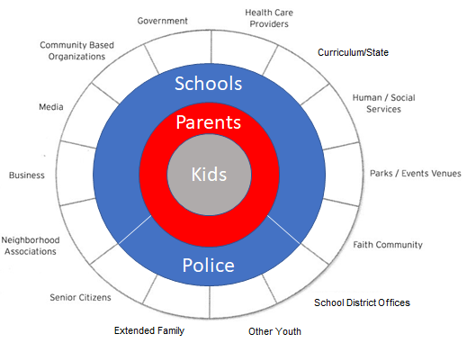Community wheel for reducing underage drug & alcohol use
Once parents are up-to-date and understand the implications of both underage substance use and marijuana legalization, many realize they can make an even bigger difference by reaching out. This can take many forms.
Add your voice - from time-to-time, Parent Movement 2.0 partners will send emails that describe an issue at the local, state or federal level. That email will include quick “click here” instructions for adding your voice to the concern. You decide at-that-time to add your voice to that particular topic or not.
Take action – look around, locate problems or issues, assess needs, determine root cause.
Generally, “action” is needed in two ways:
Building awareness
Bring updated information to other adults on the community wheel…partner with them in efforts to make the community more favorable towards youth health
Work with youth to encourage “one choice” or “wait 21” type behaviors
Advocacy
Understand local laws & ordinances that govern underage substance use & access - work to strengthen them
If living in a rec-legal state, become aware of which lawmakers & candidates are aligned with pro-pot interests; follow pro-pot legislation and speak out against it
In all states, begin to understand how tobacco/nicotine, marijuana & alcohol lobbyists operate in your state government
Generally, advocacy is political in nature, but you may find groups of people that are suffering without a voice and in need of social advocacy as well
Group Work
Locate alcohol and other drug (AOD) organizations in your city, county and state. As a starting place, search https://themarijuanareport.org/links/ - for a list of nonprofit organizations working to build communities free of marijuana and/or other addictive drugs.
Not finding a group or the right one, form an official Parent Community Group (PCG) to address the particular needs of your community and beyond.
Explore PM2.0’s PCG Support materials (being developed) for getting started - organizing methodologies, PCG formation toolkit that includes advocacy approaches, case studies of what’s worked and fundraising techniques.
Individual Work
A parent that wants to go it alone can begin volunteering for parent education, curriculum development or health/wellness committees and/or bring updated drug/alcohol information to other organizations they belong to.
Peer to Peer
Herren Project Clubs - Herren Project Clubs create a peer network in schools to empower youth to make healthy choices.
ADAPT Peer-to-Peer Club - students talking to students can be powerful - check out this video.
Teen/Student Focused Materials
National Institute of Drug Abuse for teens - A trusted source for science-based information on teen drug use and its effects. https://teens.drugabuse.gov
Natural High.org – Inspire every kid in America to live naturally high - https://naturalhigh.org/
Working through School Channels
(Examples)
School Curriculum - Evaluate current drug education efforts; look for ways to strengthen and expand it across grades 4th – 12th cohesively; partner with schools and district.
Study “Healthy Kid” type survey data – focus on alcohol, marijuana, nicotine and other drug use on campus or in district. Usage data and perception can be aligned or different. If your kids feel alcohol and drugs are “everywhere,” start with the data and begin conversations with school and district administrations on how to create change kids can feel.
We’re all in this together – gather representatives from law enforcement, the school or school district and parents to discuss roles and responsibilities. Explore ways to best partner in the goal of reducing underage substance use.
Substance-free Athletics– a partnership approach to reducing substance use in high school athletic programs/teams
The First Day film - powerful conversation starter for students, parents, teachers and administration. Chris Herren, former NBA player and recovering addict changes the Drug & Alcohol discussion. Instead of telling his addiction story, Mr Herren focuses on where the story began – in high school. See film purchase options at https://thefirstdayfilm.com/
Use discussion materials from the site or use Parent Movement 2.0’s discussion guide: The First Day – Discussion topics, 21st Century Alcohol & Drug basics (getting up to date) and other resources.
Community Efforts (examples)
Letters to editors, speaking at city council meeting, meet with law enforcement – use these simple civic tools for any community issue, i.e. establishing a Social Host Ordinance, dealing with an outlet repeatedly selling to minors, etc…
Conduct Recognize and Remind efforts - at liquor stores and marijuana dispensaries if in a Rec-Legal state.
Organize local activities to participate in national efforts like Red Ribbon Week
Explore the 420 Safety Program offered by PM2.0 Partner AALM – includes a program explanation, safety objectives, background information, and a variety of ways to engage one’s community in the goal of keeping safe during the marijuana holiday called 420
Initiate or support significant policy-change efforts.
- SAM - Local control resources







